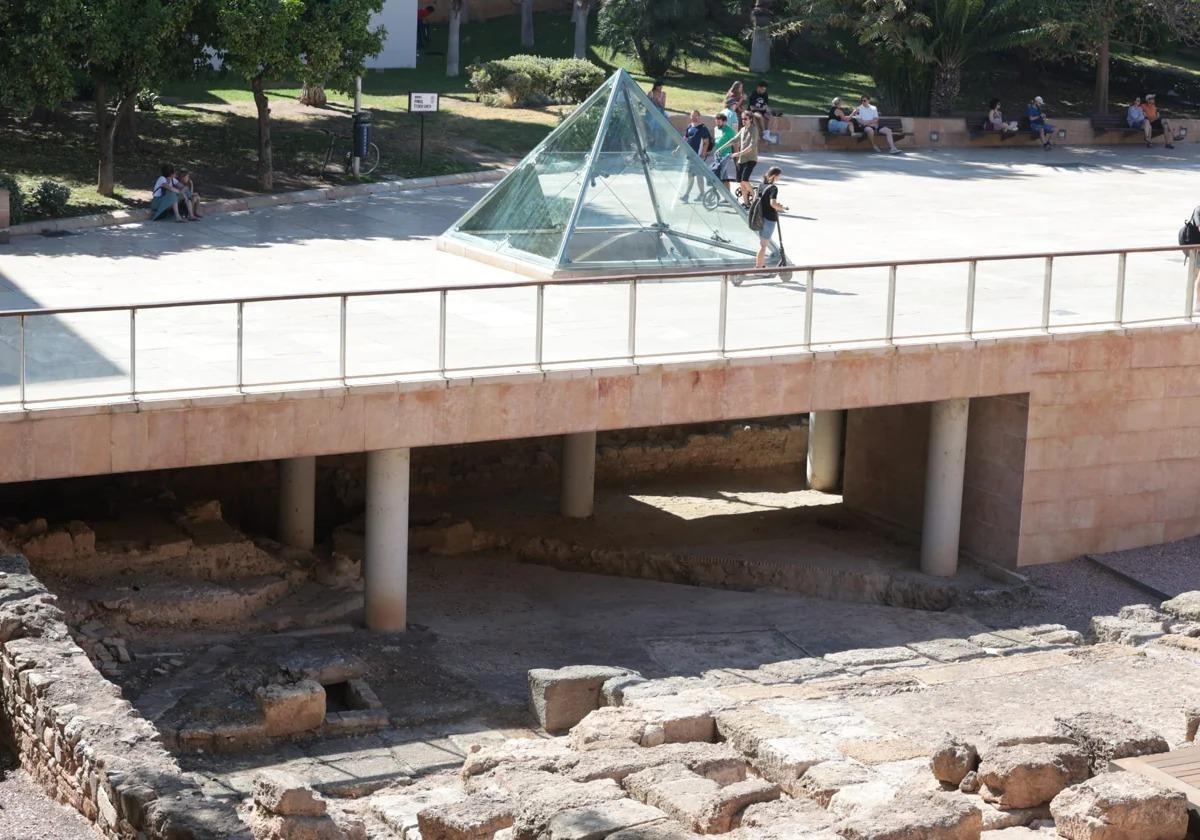Junta attempts for third time to make important Roman remains under Malaga street accessible to visitors
The Andalusian regional ministry of culture is processing a new version of the plans following two previous unsuccessful attempts to contract the work
If the saying "third time lucky" is true, the Junta de Andalucía regional government should be closer to fulfilling the project regarding opening the Roman remains under the central Calle Alcazabilla in Malaga to visitors. The discovery was made between 2008 and 2010, when the city council was executing pedestrianisation work.
During the last five years, the Andalusian government has unsuccessfully tried to contract the work to build a walkway that would allow people to visit the Roman theatre to view the remains, which can currently only be partially seen beneath a glass pyramid in the middle of the street. The remains belonged to a Roman factory specialising in the production of 'garum' - fermented fish sauce, which turned Roman Malaca into a prosperous city. In addition, parts of pavements that belonged to the Republican baths prior to the construction of the Roman theatre were also discovered. It is believed that they were created in the 1st century and were later abandoned around the 3rd century.
In January 2020, the regional ministry of culture began the process of contracting the drafting project. The design of this intervention was awarded in August 2020 to Almeria-based company Unión para la Mejora de la Construcción, for an amount of 14,250 euros and a completion period of four months.
A first version of this project was delivered by the company in December 2020. However, the objections of the technicians of the regional ministry didn't make approval possible until March 2023. During 2021 and a good part of 2022, the technicians issued successive objections that led to modifying the design of the initially proposed plan on up to five occasions until the definitive version was obtained.
The project includes cleaning and consolidation work on the archaeological walls and profiles and the construction of a walkway with wooden slats to allow visitors to approach the remains beneath Alcazabilla Street from a viewing platform. It also includes the development of an augmented reality app and the generation of QR codes to inform the public of the history of the remains.
In June 2023, the regional ministry of culture put the project out to tender, with a budget of 93,333 euros (80% European funding) and a six-month completion period. However, this procedure was unsuccessful because only one bid was submitted, which was rejected by the Junta due to an issue related to the person in charge.
In 2024, the Andalusian government once again tried to contract the project. A new tender was launched and a company was proposed as the winning bidder, but the Junta required documentation that the company did not submit, so the tender was once again declared void. After this second setback, the regional ministry decided to commission the same Almerian company that drew up the project in 2020 to revise the document in order to stop the deterioration of the walls surrounding the excavations under Calle Alcazabilla and the slope of the southern access to the Roman Theatre.
"They have been quite exposed to adverse weather conditions, which have caused loss of material; it is necessary to stabilise both areas to prevent future collapses," says the documentation to which SUR has had access. In December 2024, the latest version of the project was completed.
Finally, after the rectification of these objections and the approval of the Colegio de Arquitectos in May, the provincial commission of historical heritage gave the go-ahead to the latest design for the project, with a budget of 147,318 euros. The execution period has been reduced from six to five months. One of the changes consists of a slight reduction in the surface area of the platform from which the remains will be viewed, in order to avoid uncontrolled public access to the Roman Theatre. In addition, measures have been included to mitigate the effects of recent rains.
If no new issues arise, the regional ministry of culture will be able to put the contract out to tender again, for the third time. Time will tell whether it will be successful and whether the work will be carried out as designed.


Comentar es una ventaja exclusiva para registrados
¿Ya eres registrado?
Inicia sesiónNecesitas ser suscriptor para poder responder.
Necesitas ser suscriptor para poder votar.